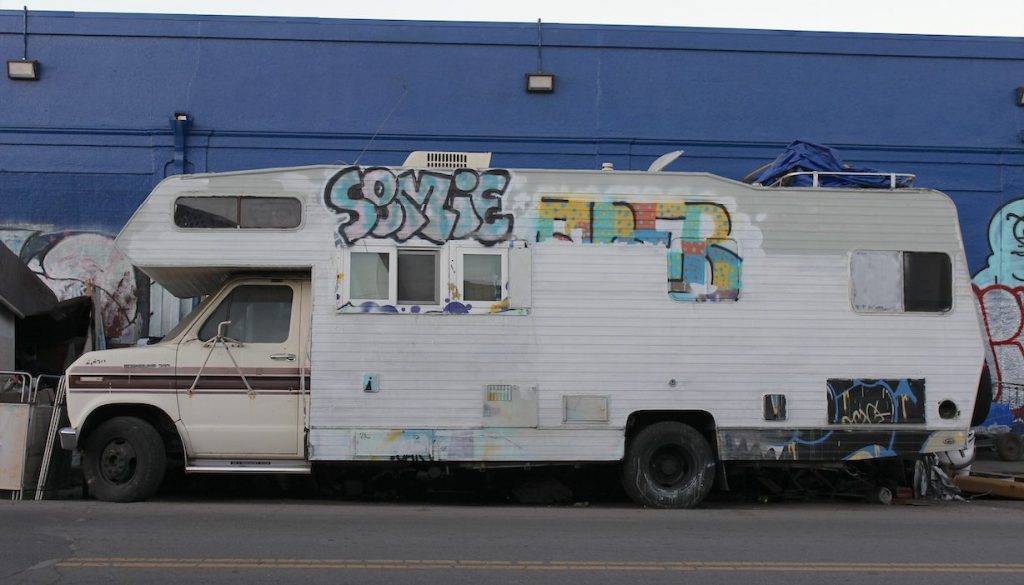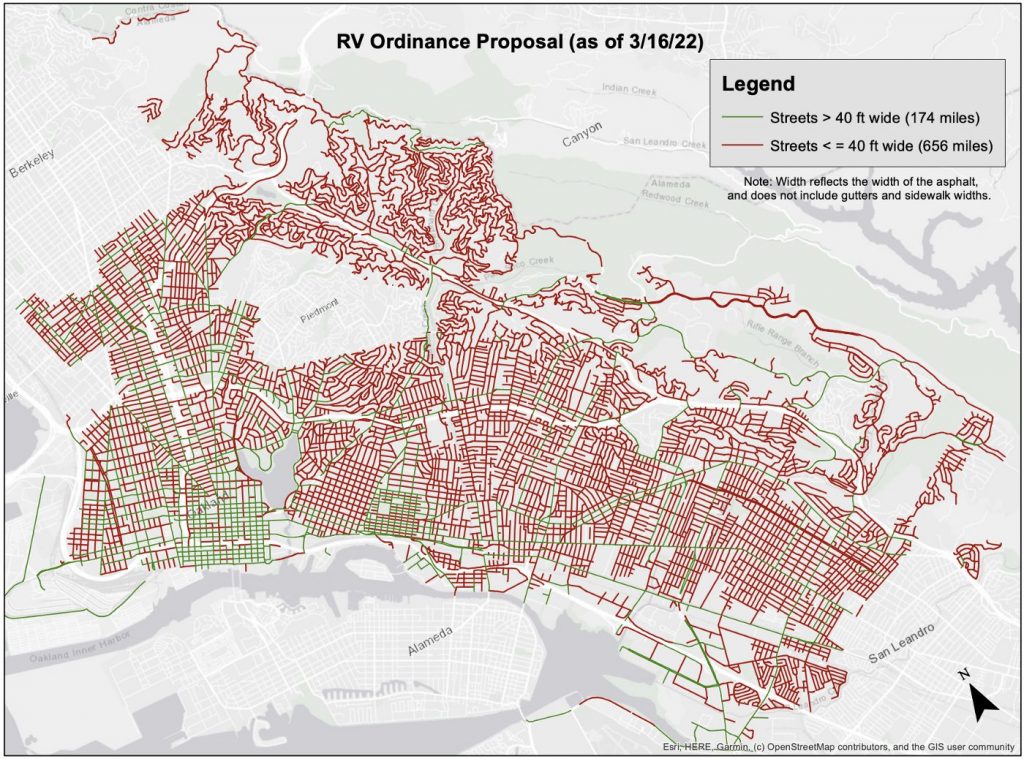
During a Public Works Committee meeting yesterday, Council Member Noel Gallo introduced an ordinance to amend the City of Oakland’s municipal code to place limitations on large non-commercial vehicles parking on certain streets.The proposal would make it illegal to park a vehicle that is longer than 22 feet, wider than 7 feet, and/or taller than 7 feet on any street that is 40 feet wide or narrower. Since the vast majority of RVs and trailers are larger than the dimensions listed, advocates for people that live in such vehicles and vehicle dwellers themselves have labeled the legislation as an RV ban. According to a draft that Oakland’s Department of Transportation shared with this reporter, about 79% of Oakland streets are 40 feet wide or narrower.
“This proposal would give the city authority to tow and impound people’s vehicle dwellings, leaving them on the street with no shelter,” reads an instagram post from Love and Justice in the Streets, a grassroots advocacy group for Oakland residents experiencing homelessness. “It does not include any real solutions or offer any housing solutions to Oakland residents who currently find shelter in RVs.”
The language in Gallo’s proposal lists blocking bike lanes, access for emergency vehicles, and improving visibility for drivers as reasons for the ban. When speaking during the meeting, he couched his reasoning for the proposal in more personal terms that blamed people experiencing homelessness for causing housed people harm.

“I think the policy is very clear, that I can’t do anything I want in front of [Council Member] Dan Kalb’s house or park my RV therein and leave my trash and garbage whenever I want to,” said Gallo. “I bring this request to you on behalf of the residents that have been here a lifetime, that are trying to send their children to school but cannot walk on the street because they’re being blocked off.”
A little over a dozen residents spoke out against Gallo’s proposal during the meeting, saying it would harm vehicle dwellers by taking their homes without offering solutions, especially as some vehicles that serve as homes are difficult to move as they no longer run.
Judy Elkin said “people need these vehicles for their homes.”
Oakland homeless resident Nino Parker said the proposal would “just put more people on the street” and that it was “going to make the problem worse.” The legislation would charge the person living in a vehicle that gets towed for towing and storage fees, although it doesn’t list where vehicles would be stored. Parker suggested that if the proposal passes, vehicle dwellers who have their homes towed should move to District 5, which is Gallo’s district.
Two residents spoke out in favor of Gallo’s proposal during the meeting. One of these residents, who identified themself only using their first name, Patricia, said “hopefully the RVs can just go into the lots that have already been set up for parking, because they pose a problem when you’re cycling around the city.”
Oakland has 147 total spaces for RV parking in the Safe Parking Programs the city has helped set up through non-profit organizations, according to Citywide Communication Director, Karen Boyd. None of these spaces are currently available for residents.
“None of the sites have vacancies right now,” wrote Boyd in an email. “Not all of the sites are full, but they are not able to take new people for various reasons.”
Gallo’s proposal does not add anymore spaces for RV parking.
Ultimately, the Public Works Committee—which includes Council Members Loren Taylor, Dan Kalb, and Sheng Thao in addition to Gallo—unanimously decided to delay voting on the proposal until a meeting on May 24. Council Members Taylor and Kalb asked for a supplemental report on the proposal that would address how it would be enforced, whether the city could determine which RVs belonged to Oakland residents and/or those who worked in Oakland, and information on similar ordinances from other nearby cities.
Council Member Thao asked for a plan as to where the RVs would go if they are towed.
“If we are removing RVs from streets, where are we bringing them?” she asked. Then Thao stated that she “doesn’t want them just shifting around.”
On May 24, the Public Works Committee is scheduled to receive a supplemental report that aims to address Taylor, Kalb, and Thao’s inquiries about Gallo’s proposal. The committee is then scheduled to vote on the proposal. If the majority of the committee votes to pass the proposal, the entire City Council could then vote it into law in a future meeting.
A version of this story was originally published by the Post News Group.
Zack Haber is a poet and journalist who lives in West Oakland.
